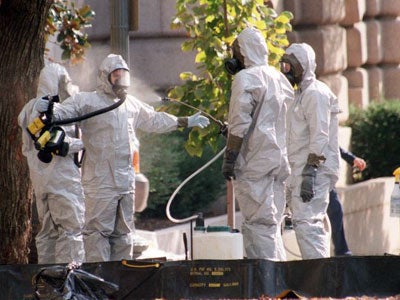Scientist commits suicide over anthrax charges

A top US biodefence researcher committed suicide just before being charged over the anthrax mailings that traumatised America after the 11 September 2001 terrorist attacks.
The scientist, Bruce E Ivins, 62, who worked for the past 18 years at the US government's biodefence labs at Fort Detrick, Maryland, had been told about the impending prosecution.
The laboratory was at the centre of the FBI's investigation of the anthrax attacks, which killed five people.
Ivins died of a drug overdose on Tuesday at Frederick Memorial Hospital in Maryland.
Henry Heine, a scientist who worked with Ivins on inhalation anthrax research at Fort Detrick, said he and others on their team have testified before a federal grand jury in Washington that has been investigating the anthrax mailings for more than a year.
Ivins was the co-author of numerous anthrax studies, including one on a treatment for inhalation anthrax published in the 7 July issue of the journal Antimicrobial Agents and Chemotherapy.
Last month, the US government exonerated another scientist at the Fort Detrick lab, Steven Hatfill, who had been identified by the FBI as a "person of interest" in the anthrax attacks.
The government paid Mr Hatfill $5.82m (£2.9m) to settle a lawsuit he filed against the Justice Department in which he claimed the department violated his privacy rights by speaking to reporters about the case.
Federal investigators moved away from Mr Hatfill and concluded Ivins was the culprit after FBI director Robert Mueller changed leadership of the investigation in 2006.
The new investigators instructed agents to re-examine leads and reconsider potential suspects. In the meantime, investigators made progress in analysing anthrax powder recovered from letters addressed to two US senators.
Besides the five deaths, 17 people were made ill by anthrax that was posted to politicians on Capitol Hill and members of the news media in New York and Florida just weeks after the 11 September terrorist attacks.
The victims included postal workers and others who came into contact with the anthrax.
In January 2002, the FBI doubled the reward for helping solve the case to $2.5m (£1.25m), and by June officials said the agency was scrutinising 20 to 30 scientists who might have had the knowledge and opportunity to send the anthrax letters.
After the US government's settlement with Mr Hatfill was announced in late June, Ivins started showing signs of strain. A colleague said he was being treated for depression and indicated to a therapist that he was considering suicide.
Family members and local police escorted Ivins away from the Army lab, and his access to sensitive areas was curtailed. Ivins was facing a forced retirement in September.
Ivins was one of the nation's leading biodefence researchers.
In 2003, he and two of his colleagues at the US Army Medical Research Institute of Infectious Diseases at Fort Detrick received the highest honour given to Defence Department civilian employees for helping solve technical problems in the manufacture of anthrax vaccine.
In 1997, US military personnel began receiving the vaccine to protect against a possible biological attack.
Ivins was the son of a Princeton-educated pharmacist who was born and raised in Lebanon, Ohio. He received undergraduate and graduate degrees, including a PhD in microbiology from the University of Cincinnati.
Join our commenting forum
Join thought-provoking conversations, follow other Independent readers and see their replies
Comments
Bookmark popover
Removed from bookmarks